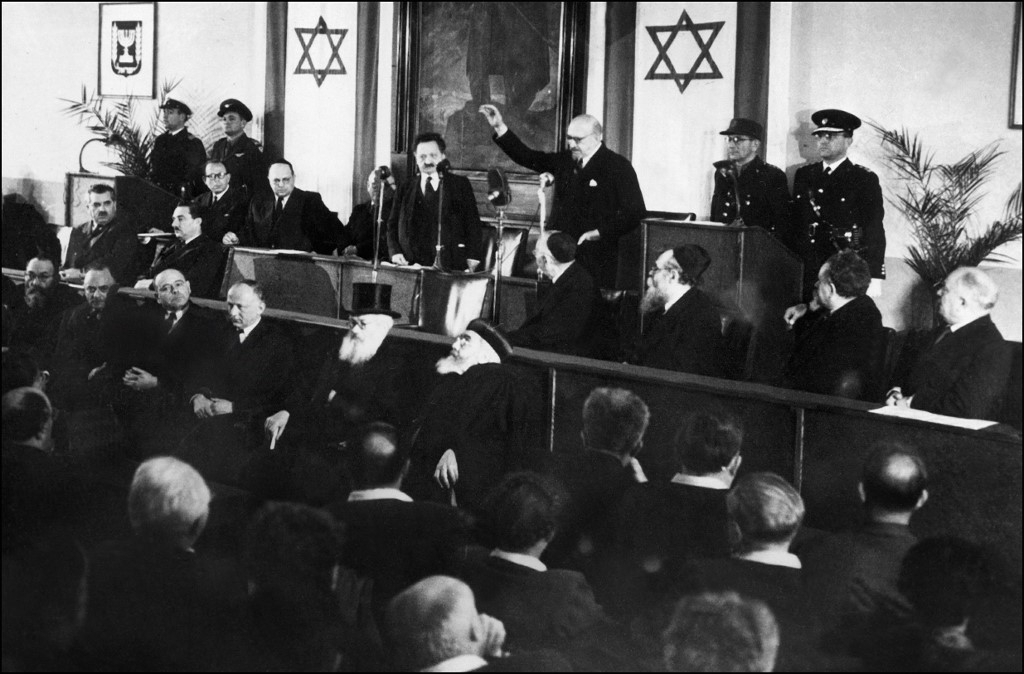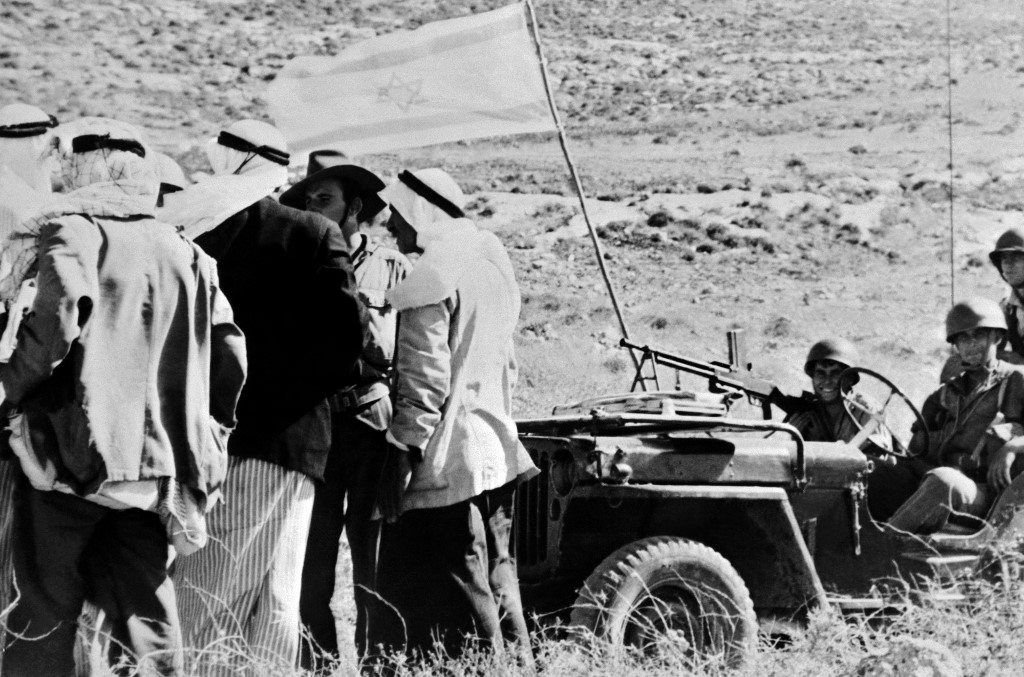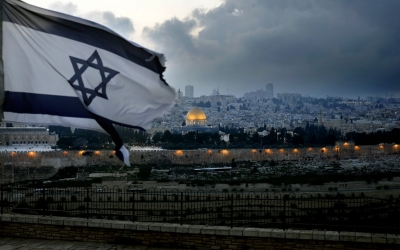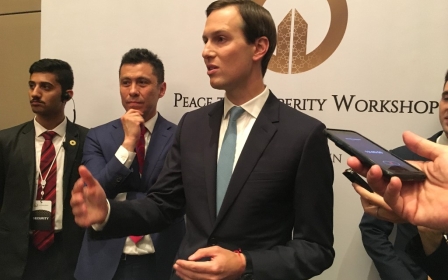Why Israel cannot be called a democratic state

The Israeli elections last spring were seen in the Western press and among some Western politicians as confirmation that Israel is becoming less democratic, and more racist and chauvinistic.
This we are told is undermining Israel as a “Jewish and democratic state”. The New York Times reported: “To the left, Israeli democracy is on the defensive. To the ethnonationalist right, which succeeded last year in enshrining Israel’s self-definition as the nation-state of the Jews in a basic law, it is in need of an adjustment.”
The general celebratory line that Israel has been able to balance its two important ideals and core principles - namely, that it is “a Jewish and a democratic state” - has shifted recently with some now lamenting that this alleged balance has been offset by the country’s “recent” right-wing tilt.
Commitment to ethnic cleansing
The major fact that such a depiction deliberately ignores is that “democracy” in Israel was established for Israeli Jews after the Zionists expelled 90 percent of the Palestinian population when Israel was founded in 1948, making themselves a majority overnight in the ethnically cleansed country.
They opted for liberal democratic governance for the colonial Jewish majority, while instituting a legal apartheid system for the Palestinians they could not expel, including dozens of racist laws.
This commitment to ethnic cleansing and Jewish supremacist rule has been an ideological cornerstone of the Zionist movement since its inception.
Theodor Herzl, the father of Zionism, devised plans on what to do with the native Palestinians. In his 1896 foundational pamphlet The State of the Jews, he cautioned against any democratic commitments and advised that “an infiltration [of Jews into Palestine] is bound to end in disaster. It continues till the inevitable moment when the native population feels itself threatened, and forces the [existing] government to stop further influx of Jews. Immigration is consequently futile unless based on an assured supremacy.”
The so-called formula of a 'Jewish and democratic state' ... was always based on an arithmetic of Jewish supremacy and ethnic cleansing
The Jewish colonists, Herzl wrote in his diary, should “try to spirit the penniless population across the border by procuring employment for it in the transit countries, while denying it any employment in our country …
"The removal of the poor must be carried out discreetly and circumspectly. Let the owners of immovable property believe that they are cheating us, selling us things for more than they are worth. But we are not going to sell them anything back.”
As Jewish colonies multiplied, so did the expulsion of Palestinians. Polish agronomist and colonist Chaim Kalvarisky, a manager of the Jewish Colonization Association, reported in 1920 that as someone who had been dispossessing Palestinians since the 1890s, “the question of the Arabs first appeared to me in all its seriousness immediately after the first purchase of land I made here. I had to dispossess the Arab residents of their land for the purpose of settling our brothers.”
Kalvarisky complained that the “doleful dirge” of those he was forcing out “did not stop ringing in my ears for a long time thereafter”.
Categorical opposition
Zionists’ fear of universal democracy, and their commitment to ethnic cleansing, was so strong that after the First World War, when the British - concerned with overextending themselves - wanted to ask the US to assume part of the responsibility for Palestine, they opposed it categorically.
The World Zionist Organization (WZO) objected vehemently to US involvement: “Democracy in America too commonly means majority rule without regards to diversity of types or stages of civilization or differences of quality … The numerical majority in Palestine today is Arab, not Jewish. Qualitatively, it is a simple fact that the Jews are now predominant in Palestine, and given proper conditions they will be predominant quantitatively also in a generation or two,” the WZO stated.
“But if the crude arithmetical conception of democracy were to be applied now or at some early stage in the future to Palestinian conditions, the majority that would rule would be the Arab majority, and the task of establishing and developing a great Jewish Palestine would be infinitely more difficult.”
Note that the WZO ignored the fact that Native Americans and African Americans, among others, were not included in the US version of “democracy”.
In the same year, Julius Kahn, a Jewish US Congressman, delivered a statement endorsed by around 300 Jewish personalities - both rabbis and laymen - to then-president Woodrow Wilson, whose administration supported Zionists.
The statement denounced Zionists for attempting to segregate Jews and reverse the historical trend towards emancipation, and objected to the creation of a distinctly Jewish state in Palestine as contrary “to the principles of democracy”.
'Compulsory transfer'
Herzl’s foundational fear of democracy was adopted by his Zionist followers. On the right, the founder of Revisionist Zionism, Vladimir Jabotinsky, argued in 1923 against the Zionist Labor “left” who wanted to expel the Palestinian population through trickery, explaining that there was no escape from the violent formula that Jewish colonisation and expulsion of the Palestinians were one and the same process.
“Any native people … will not voluntarily allow, not only a new master, but even a new partner. And so it is for the Arabs,” Jabotinsky noted. “Compromisers in our midst attempt to convince us that the Arabs are some kind of fools who can be tricked … [and] who will abandon their birth right to Palestine for cultural and economic gains. I flatly reject this assessment of the Palestinian Arabs.”
In the 1920s and 1930s, Zionists strategised plans for the ethnic cleansing (what they termed “transfer”) of Palestinians. Concurring with Jabotinsky, David Ben-Gurion, the Labor Zionist leader of the colonial settlers, declared in June 1938: “I support compulsory transfer. I do not see anything immoral in it.”
His statement followed the policy adopted by the Jewish Agency, which set up its first “Population Transfer Committee” in November 1937 to strategise the forceful expulsion of the Palestinians. Two additional committees were established in 1941 and 1948.
Enemies of Palestinians
Chaim Weizmann, head of the WZO, entertained in 1941 plans to expel one million Palestinians to Iraq and replace them with five million Polish and other European Jewish colonists. He told his plans to the Soviet ambassador in London, Ivan Maisky, in hopes of obtaining Soviet support.
When Maisky expressed surprise, Weizmann replied with a racist argument, not unlike that used by fascists against European Jews in the same period: Palestinians’ “laziness and primitivism turn a flourishing garden into a desert. Give me the land occupied by a million Arabs, and I will easily settle five times that number of Jews on it.”
Other settler colonies were able, after centuries of ethnic cleansing, to institute white demographic supremacy
The so-called formula of a “Jewish and democratic state”, which so many of Israel’s apologists fear may now be in peril, was always based on an arithmetic of Jewish supremacy and ethnic cleansing - not unlike the white supremacist liberal democracies established after ethnic cleansing in the US, Canada, Australia and New Zealand.
But while the other settler colonies were able, after centuries of ethnic cleansing, to institute white demographic supremacy - although the current anti non-white-immigration policies in the US show how delicate this balance has become - Israel’s colonial Jewish population went back to being a minority facing a Palestinian native majority.
That majority continues to resist ethnic cleansing and Jewish supremacist rule, which Israel’s supporters and the enemies of Palestinians celebrate as “a Jewish and democratic state”.
The views expressed in this article belong to the author and do not necessarily reflect the editorial policy of Middle East Eye.
Middle East Eye propose une couverture et une analyse indépendantes et incomparables du Moyen-Orient, de l’Afrique du Nord et d’autres régions du monde. Pour en savoir plus sur la reprise de ce contenu et les frais qui s’appliquent, veuillez remplir ce formulaire [en anglais]. Pour en savoir plus sur MEE, cliquez ici [en anglais].







